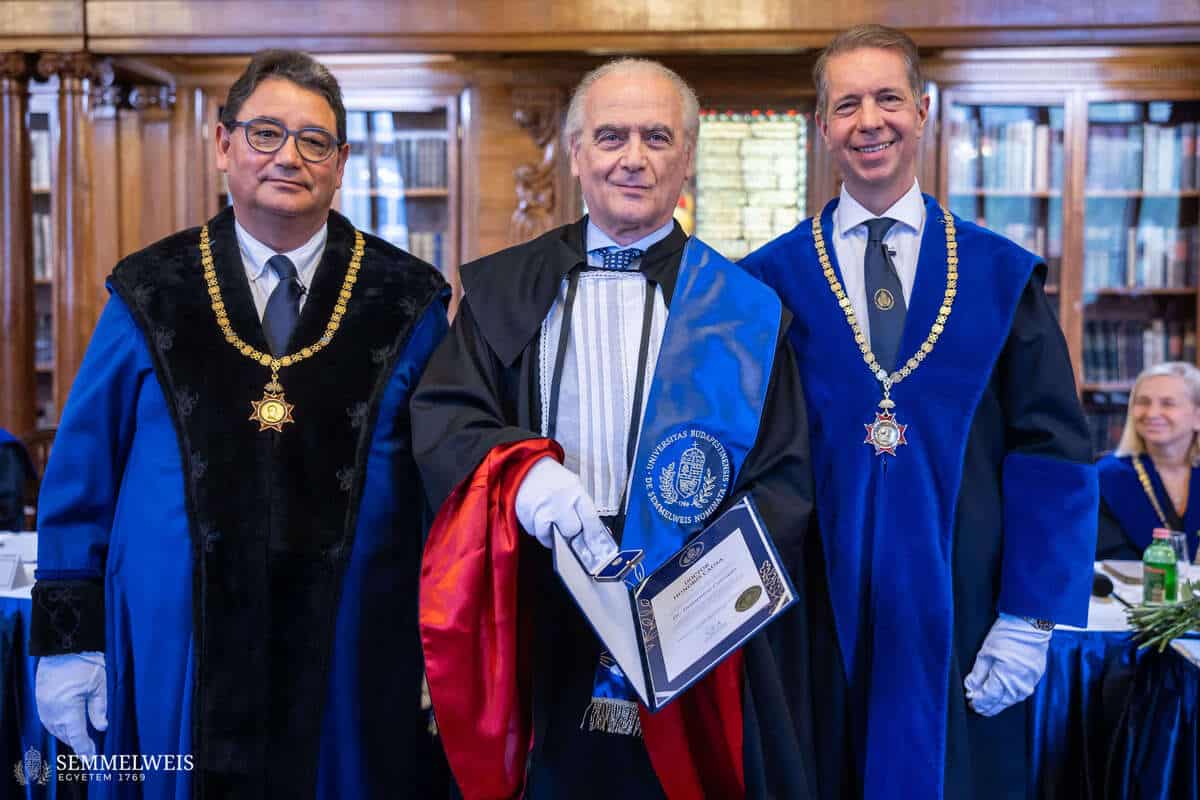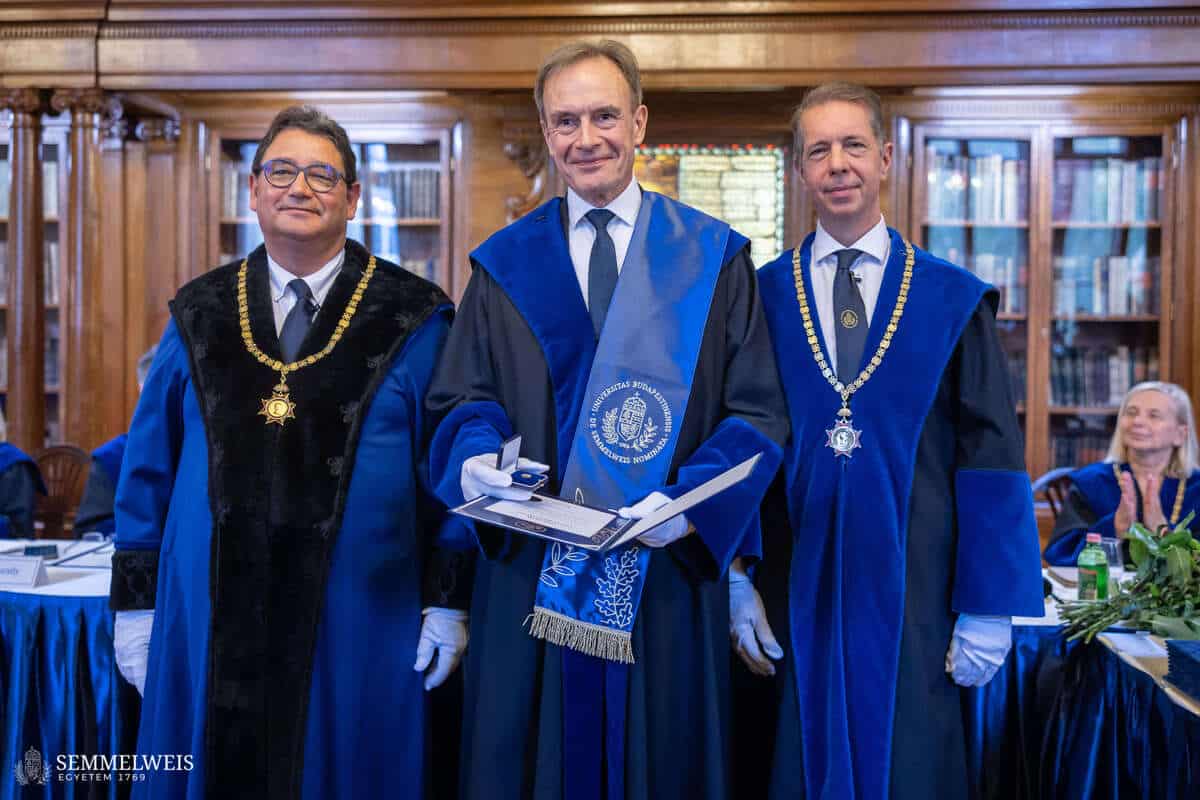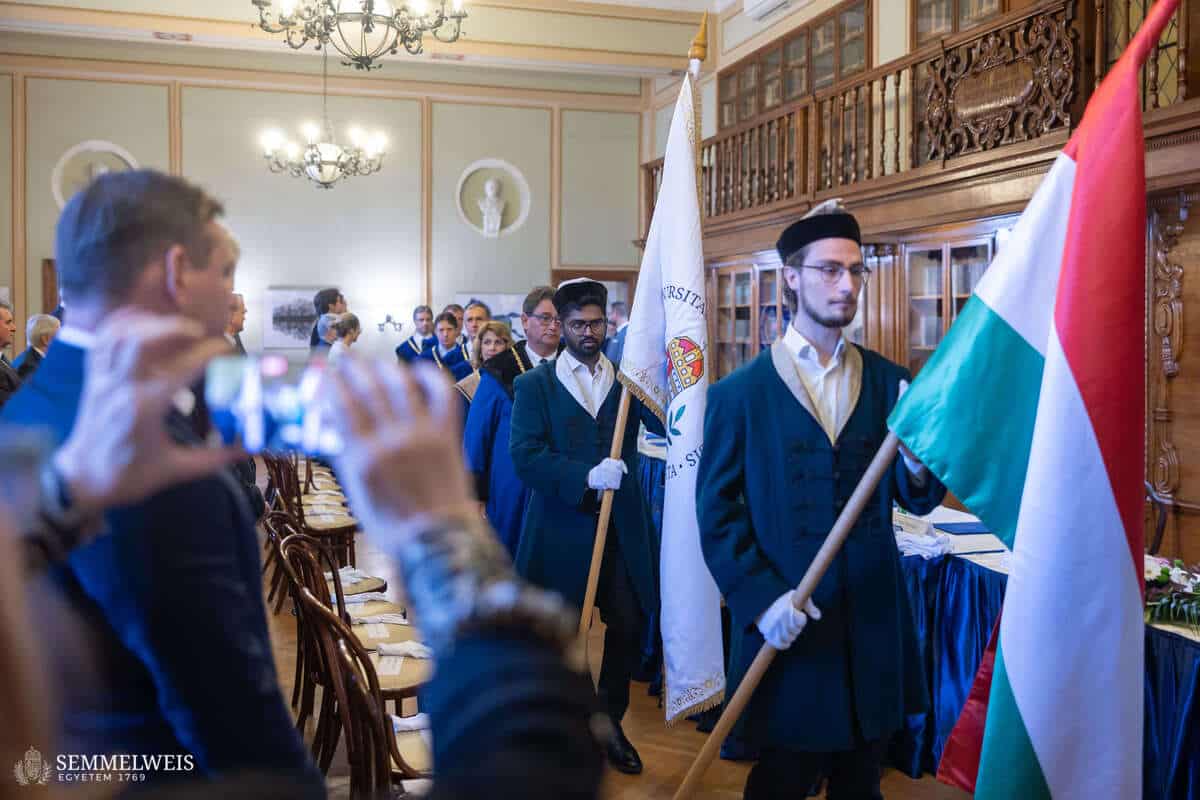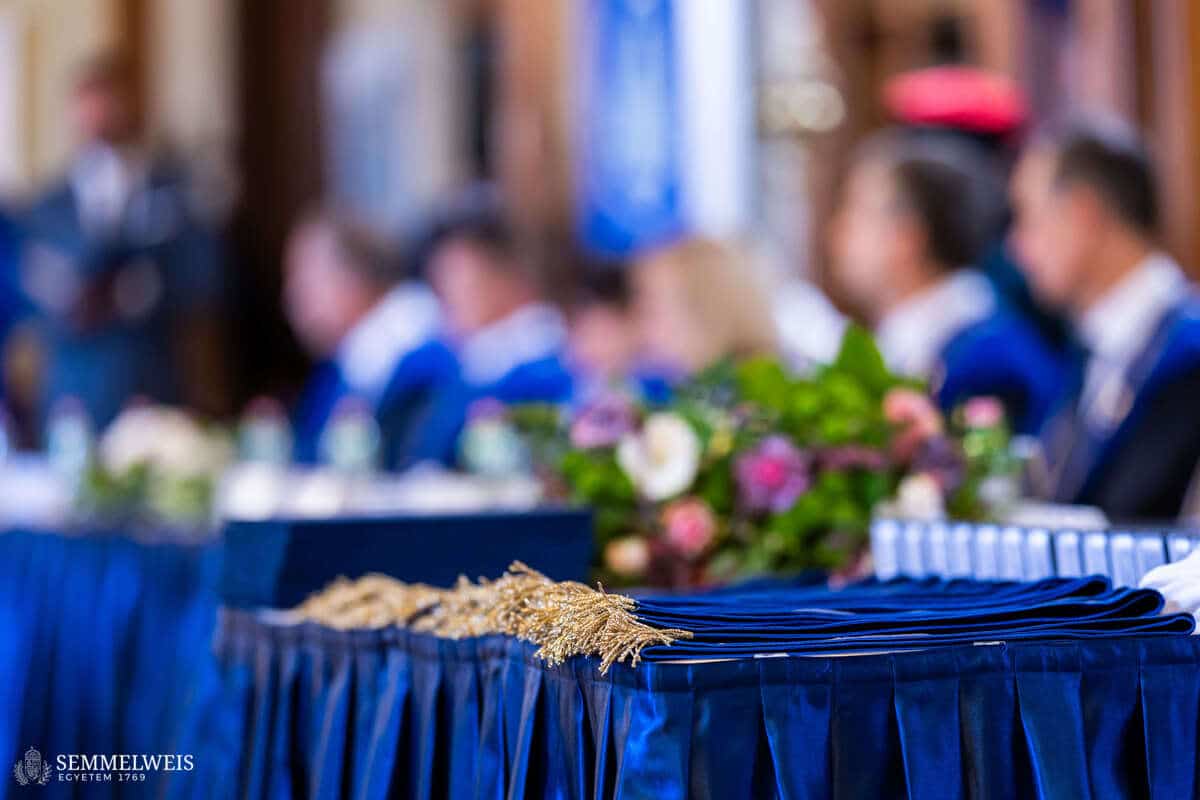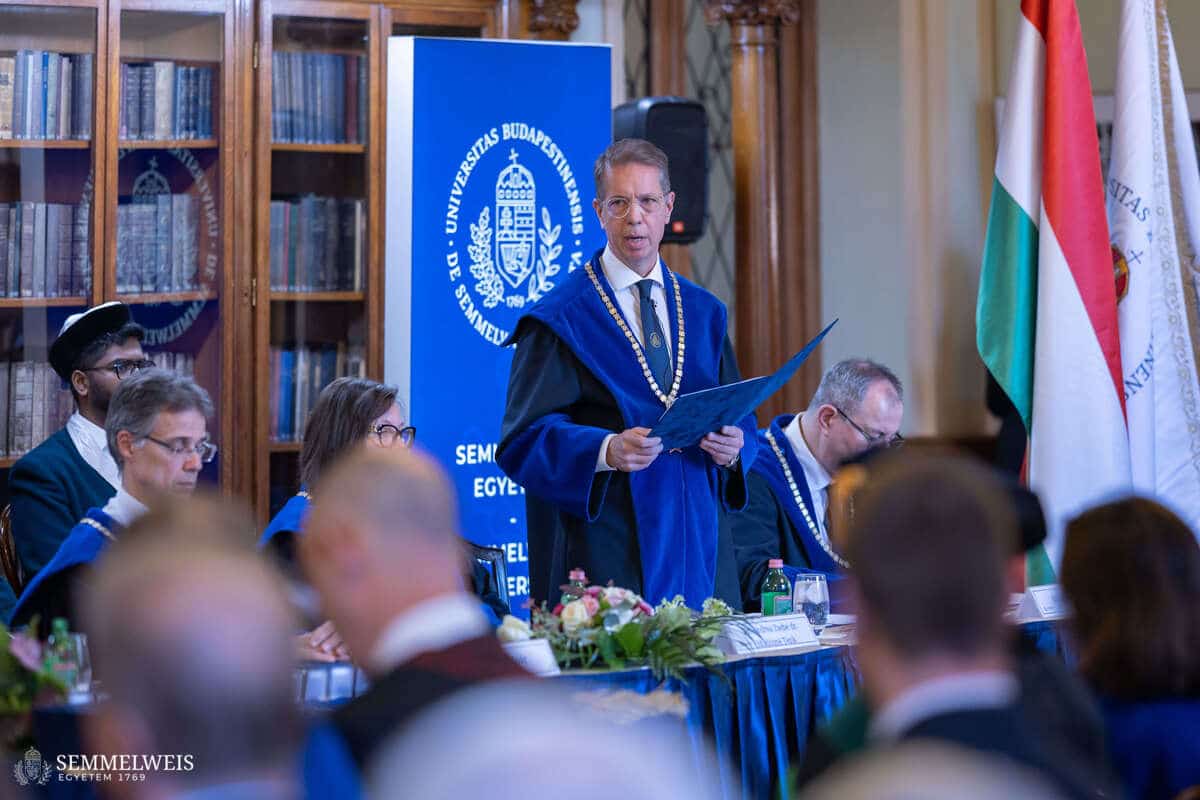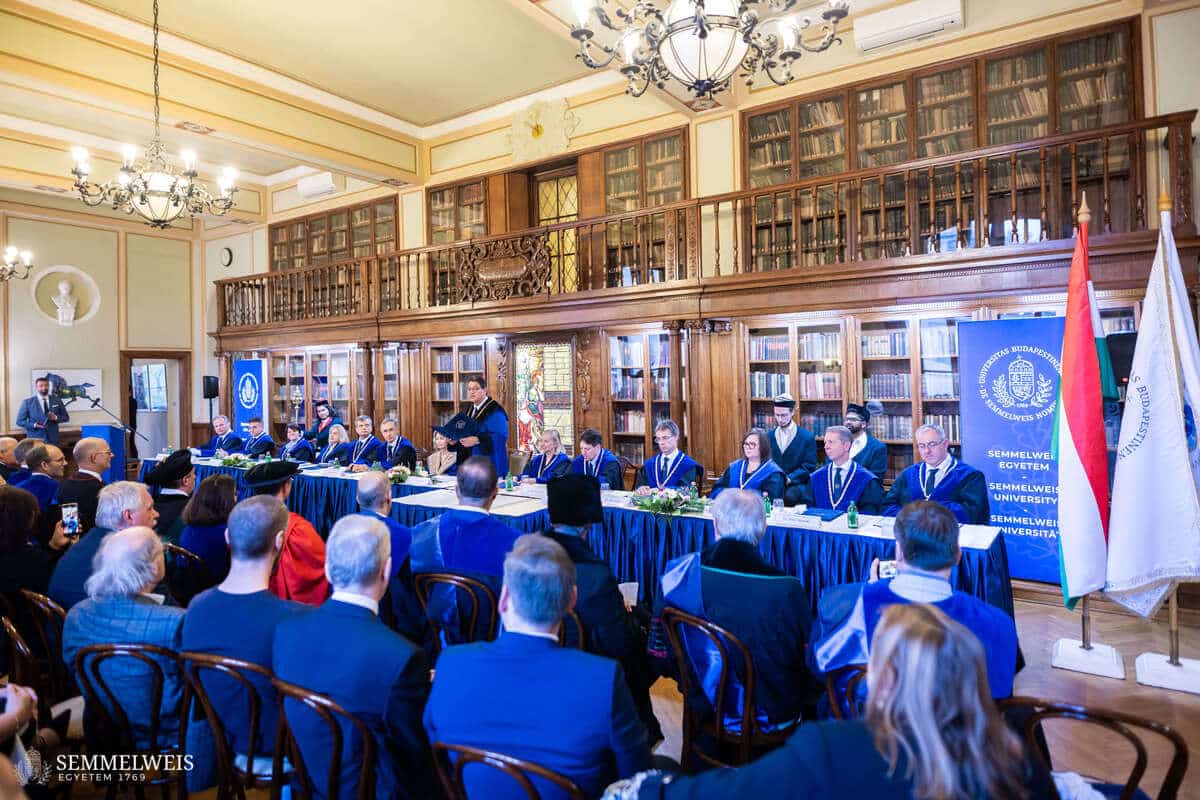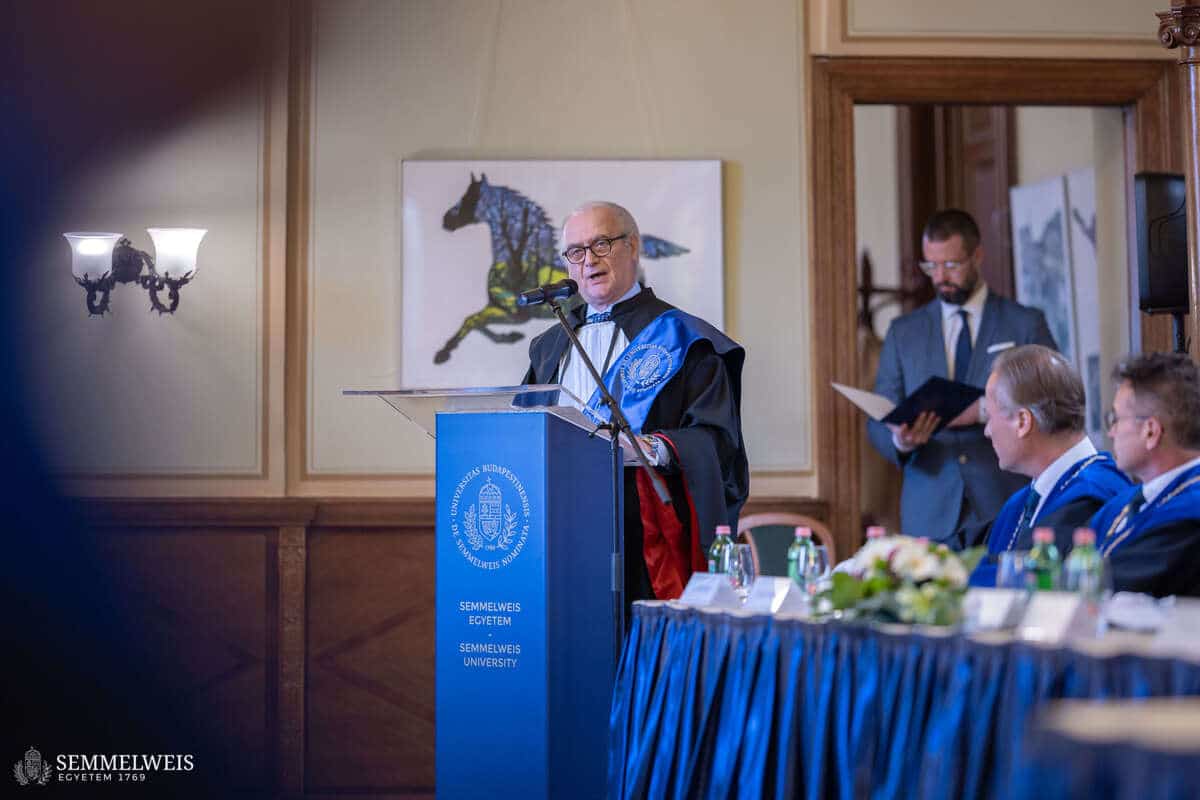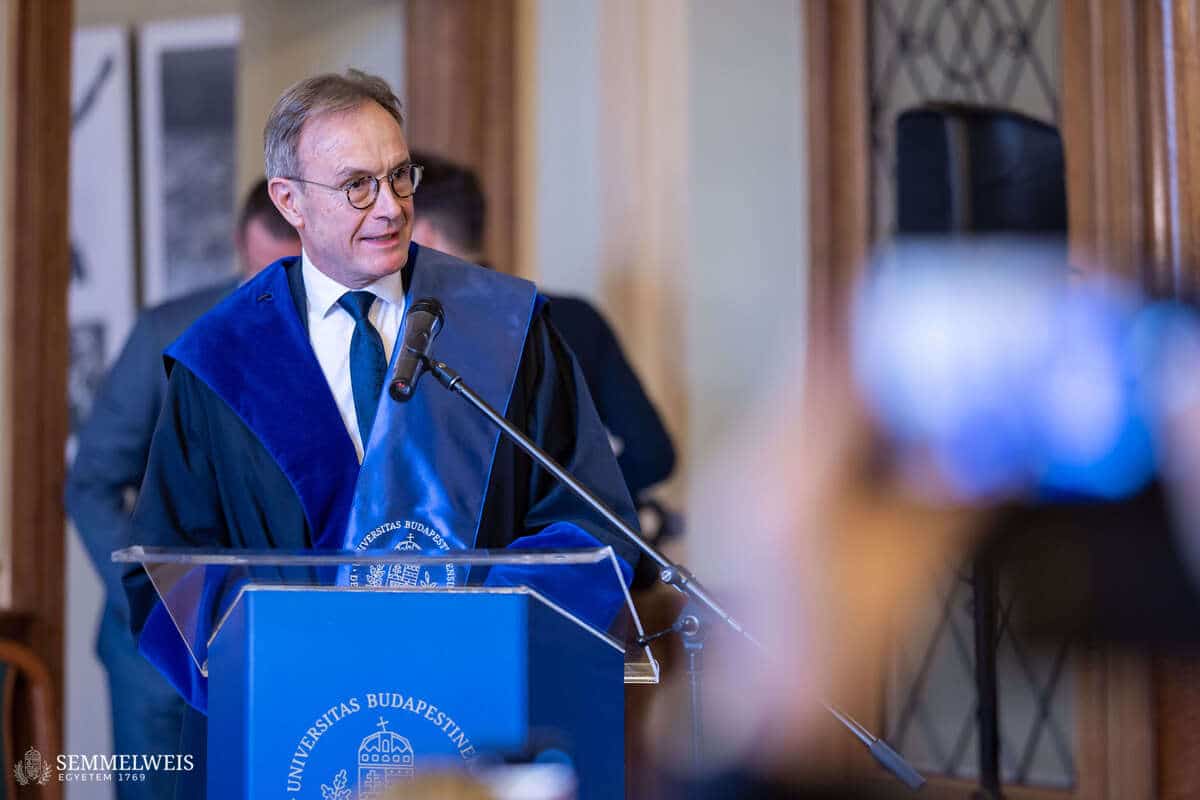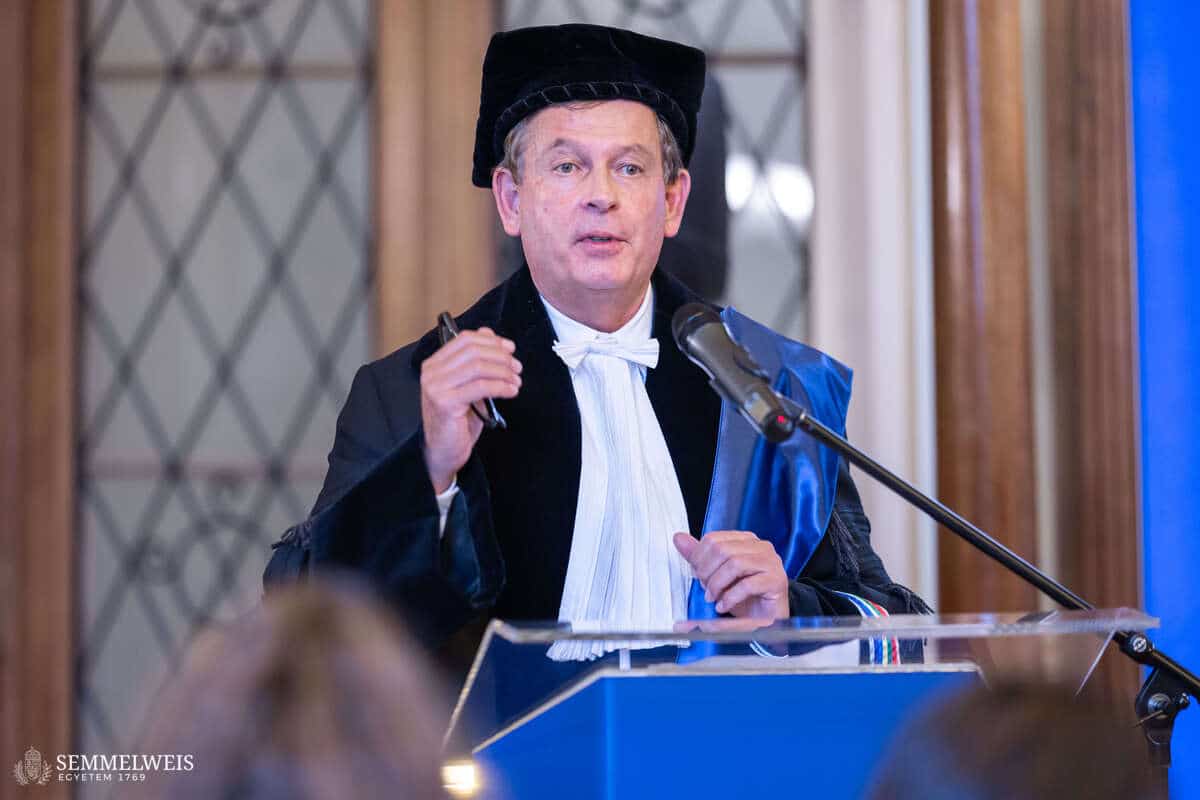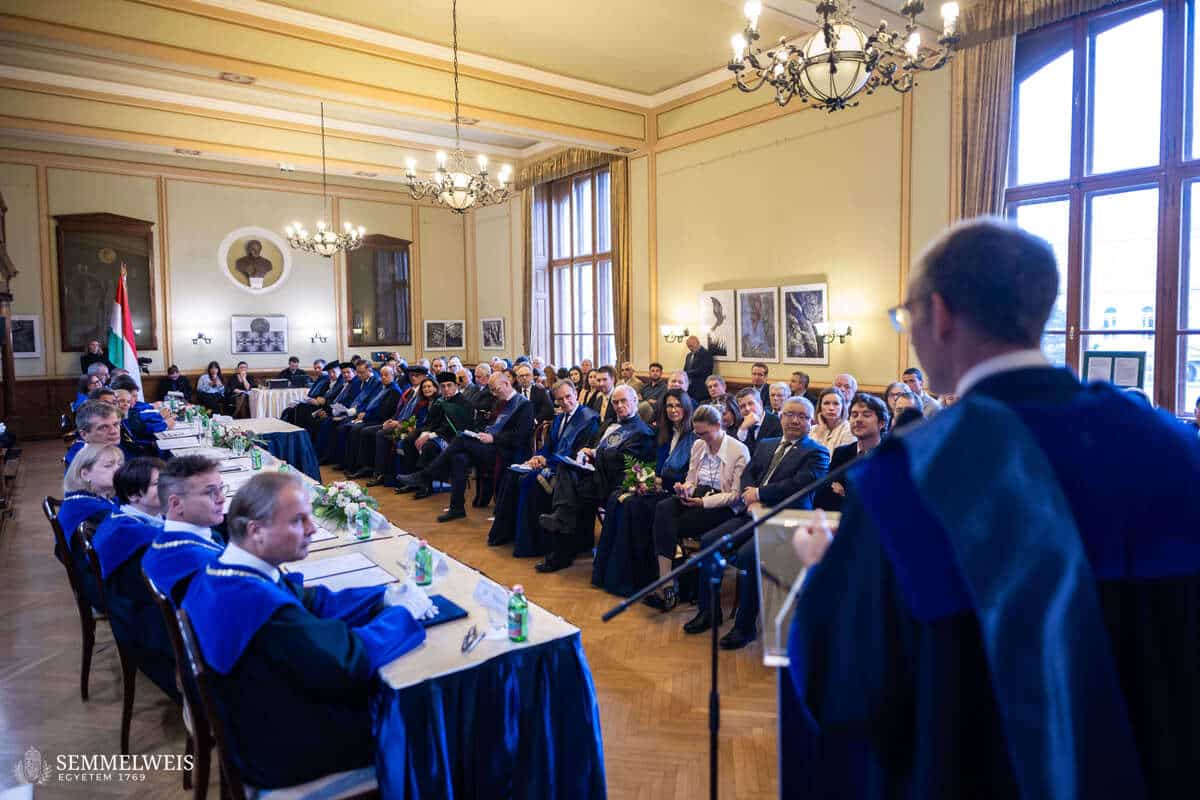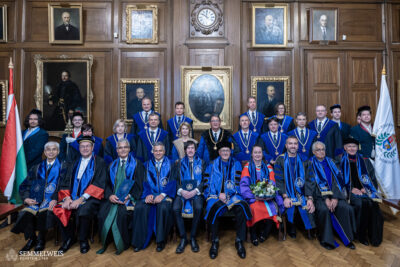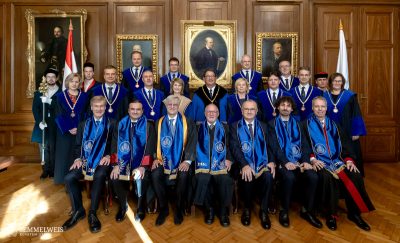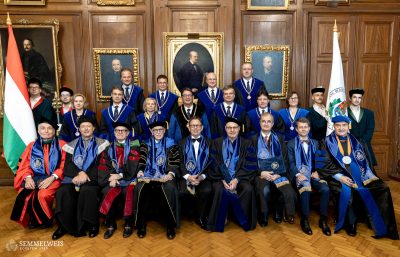In his welcome address, Rector Dr. Béla Merkely reminded the audience that scientists often focused their attention on statistical data and measurement results. “However, we must not forget that behind all this lies the beauty of research and the possibility of connecting with the infinite. In our profession, in the field of medicine and health sciences, we also share the great hope that our work will contribute to the development of more effective therapies, more efficient drugs, better procedures, and ultimately to preserving the health and improving the quality of life of the people entrusted to our care – this is the result that makes our research complete,” he said. He added that international collaborations, without which it would be impossible to achieve great results today, brought the institution closer to this goal – and the Doctor Honoris Causa event was a special celebration of these collaborations.
As he explained, the key to the university’s achievements was cross-border knowledge-sharing, the collaborations the institution had with scientific workshops, clinics, and universities around the world. Without these connections, without these cooperations, Semmelweis University would not be so successful, Dr. Béla Merkely pointed out, adding that this would further invigorate scientific life in Hungary, of which the university was the undisputed flagship.
In 2025, the Senate decided to award honorary doctorates to internationally recognized experts who have maintained close ties with the institution, in the fields of genetics, pediatrics, nephrology, cardiology, sports medicine, vascular surgery, urology, and uro-oncology, molecular neurobiology, interventional radiology, vascular biology, proteomics, metabolomics, mi-RNA research, drug research, cardiovascular translational medicine, orthopedics and traumatology, nanomedicine, clinical pharmacology, psychiatry, addictology, and pediatric hematology-oncology.
After the opening ceremony, Dean Dr. Péter Nyirády lauded the professors nominated by the Faculty of Medicine in his introduction.
As a pediatric nephrologist and geneticist, she has devoted her career to establishing a link between the care of children with kidney failure and molecular biology. Her contributions to medical genetics have transformed our understanding of hereditary kidney diseases. At the Imagine Institute in Paris, she heads one of Europe’s leading research groups on hereditary kidney disorders, uniting clinical expertise with cutting-edge genomics to decipher the causes of rare diseases. She and her research team identified the major genes of nephrotic syndrome, nephronophthisis, renal Fanconi and Galloway-Mowat syndromes, which are responsible for one-fifth of chronic kidney failure in children. Her results revealed the central role of podocytes in kidney filtration, the pathophysiology of cystinosis or the role of RNA modification in Galloway-Mowat syndrome. Her findings have revolutionized diagnosis, genetic counselling, and opened new avenues for causal therapies: discoveries which have reshaped modern nephrology.
He is an internationally recognized authority in cardiovascular medicine, renowned for his pioneering contributions to the understanding and prevention of sudden cardiac death in young individuals and athletes. He is the former president of both the Italian Society of Sports Cardiology and the Sports Cardiology Section of the European Society of Cardiology, serves as Full Professor of Cardiovascular Medicine at the Department of Cardiac, Thoracic and Vascular Sciences and Public Health at the University of Padova, where he is the head of Cardiology, and directs the Inherited Arrhythmic Cardiomyopathy Unit and a master’s course in sports cardiology. His pioneering work on arrhythmogenic and other inherited cardiomyopathies has reshaped global practice in sports cardiology, guiding how physicians identify and protect those at risk of life-threatening arrhythmias. He has authored over 500 peer-reviewed publications in leading journals such as The New England Journal of Medicine, The Lancet, Circulation, and the Journal of the American College of Cardiology. His work has earned more than 53,000 citations, with a Hirsch index of 104. He maintains close professional ties with the Department of Sports Medicine at Semmelweis University.
As a surgeon and vascular surgeon, is the head of the Department of Vascular Medicine at the University Medical Center Hamburg-Eppendorf in Germany and the current president of the European Society for Vascular Surgery (ESVS). Since 2014, he has been the founding editor of Gefäßmedizin Scan and a member of the editorial board of several international journals. His main research areas are vascular epidemiology and vascular supply, aortic pathologies and peripheral occlusive diseases. He is a co-founder of the German Vascular Registry Program and participates in various projects of ESVS, such as the VascuNet initiative. He is also a member of the board of directors of the European Journal of Vascular and Endovascular Surgery and the guidelines committee of the ESVS. Professor Debus is one of the most influential European representatives of the field of vascular surgery. He has been collaborating with the Department of Vascular Surgery and Endovascular Surgery of the Városmajor Heart and Vascular Center for years, has given several lectures, and regularly welcomes medical students and residents of Semmelweis University for internships.
His specialty is uro-oncology research and therapy. He is currently director of the Department of Urology at the Universitätsklinikum Essen and Vice‐Director of the Westdeutsches Tumorzentrum Essen. His work ranges from the molecular biology of genito‐urinary malignancies to the implementation of cutting‐edge imaging techniques and therapies. With more than 380 peer-reviewed publications – including more than 50 in collaboration with the Department of Urology at Semmelweis University – and over 28,000 citations, Professor Hadaschik ranks among the most cited urological scholars in Germany. His research into prostate-cancer diagnostics and therapies, such as prostate cancer screening, image-guided biopsy systems, and molecularly targeted radiopharmaceuticals, has helped shape the field and offers real hope for improved, individualized patient care.
He received his PhD from Semmelweis University, graduating in 1999 as one of the first students to complete the newly introduced doctoral programs. He became tenured faculty as professor and chair of cell biology in Aberdeen, followed by professorships at Karolinska Institutet and the Medical University of Vienna. His primary research interest is the effect of maternal drug abuse on the developing brain of the baby and the endocrine systems. His work on cannabis is particularly groundbreaking and has been developed since the early 2000’s, a time when plant-derived cannabinoids were still widely used as anti-emesis medication for expecting women. Currently, he is training neuronal networks to overcome prenatal impairments, which could make headway for the treatment of neurodevelopmental disorders. He has a long-standing collaboration with the Department of Anatomy, Histology and Embryology at Semmelweis University. For the last 15 years, their common results have been published in over 30 papers in the best journals in their field, including Nature, Nature Neuroscience, Nature Communications, Acta Neuropathologica, Brain, The EMBO Journal or the Proceedings of the National Academy of Sciences.
He graduated from the predecessor of the University of Szeged, then began conducting research in Japan and the United States. He later completed training in radiology and interventional radiology at Harvard Medical School’s Brigham and Women’s Hospital. Since 2012, Professor Kis has been a leading clinician and researcher at the H. Lee Moffitt Cancer Center & Research Institute in Tampa, Florida, where he is chief of Interventional Radiology and vice-chair of the Department of Diagnostic Imaging and Interventional Radiology, as well as Professor of Oncologic Sciences and Radiology at the University of South Florida. He is internationally recognized for his pioneering work in interventional oncology, especially transarterial radioembolization (TARE) with Yttrium-90 microspheres. His innovative studies using intraprocedural 4D-CT imaging have refined the precision and safety of liver-directed cancer therapies. He is an unprecedented two-time winner of Abstract of The Year awarded at the Society of Interventional Radiology’s annual meeting. Based on his achievements he was elected as a fellow of the society.
She is president-elect of the European Society of Cardiology for 2024-2026. Throughout her career, she has held leading clinical and academic positions at the Karolinska University Hospital, including Head of Cardiology, making outstanding contributions to research, education, and patient care in cardiovascular medicine. Her scientific work has significantly advanced the understanding and treatment of heart failure and cardiac pacing. She has conducted pioneering research in hemodynamics, rate-adaptive pacing, and cardiac resynchronization therapy, and has played a key role in major European studies on heart failure with preserved ejection fraction, its epidemiology and etiology, and sex differences in arrhythmia and heart failure. Professor Linde is the executive editor of the European Heart Journal, has published over 300 peer-reviewed papers and has delivered invited lectures at more than 250 international meetings. Together with the Heart and Vascular Center of Semmelweis University, they have participated in several clinical research projects, resulting in 12 joint publications. She was elected an honorary member of the Hungarian Society of Cardiology in 2017.
He is the British Heart Foundation (BHF) Professor for Cardiovascular Proteomics and co-director of Imperial’s BHF Centre of Research Excellence. His group uses proteomics in combination with other -omics technologies to integrate biological information in disease-specific networks that drive pathophysiological changes. His research has focused on the study of molecular interactions for years, while his interest has recently shifted toward integrative network biology. He has published more than 300 peer-reviewed scientific papers, which have been cited more than 39,000 times; his H-index is 107. He actively collaborates with Semmelweis University, with eight joint university publications to date. He is consulting editor for Circulation and the Journal of Molecular and Cellular Cardiology, associated editor for Atherosclerosis and Cardiovascular Research and serves on the editorial boards of Circulation Research, Arteriosclerosis, Thrombosis, and Vascular Biology, Proteomics and Molecular & Cellular Proteomics.
He is a Professor of Pharmacology and Molecular Pharmacology at the National and Kapodistrian University of Athens, where he is now chairman of the Department of Pharmacy. He is also an affiliated investigator at the Biomedical Research Foundation of the Academy of Athens. His pioneering research has illuminated the molecular mechanisms regulating vascular tone and angiogenesis, focusing on nitric oxide (NO), cyclic GMP, and hydrogen sulfide (H₂S) signaling. With over 200 peer-reviewed publications and more than 30.000 citations, his H-index is 77. He actively collaborates with Semmelweis University, with seven joint university publications to date. Professor Papapetropoulos ranks among the world’s most influential pharmacologists. He is actively involved in international scientific associations, including The Federation of European Pharmacological Societies (EPHAR) and has been elected fellow of both the American Heart Association and the British Pharmacological Society.
He is a professor of pediatric hematology and oncology at St. Jude Children’s Research Hospital in Memphis, USA, where he runs the bone marrow failure program. He earned his medical degree and doctorate in immunogenetics of blood disorders from Charité Medical School, Berlin. From 2015 to 2018, he was affiliated with the German Consortium on Translational Cancer Research and made many connections in the pediatric hematology and oncology communities across Europe. He is a leading expert in the field of germline predisposition to bone marrow failure and leukemia. His field-leading research has been published in highly ranked journals including Blood and Nature Medicine. In the last decade, he has developed extensive collaborations with the Molecular Oncohematology research group at the Department of Pathology and Experimental Cancer Research of Semmelweis University, resulting in several joint projects and publications.
President Dr. Zoltán Benyó presented the recipients nominated by the Doctoral Council.
He has made a significant contribution to the advancement of musculoskeletal sciences, innovation in medical devices, establishment of guidelines for R&D and clinical practice, medical education, science, and technology. He has published over 400 papers in top journals, achieving an H-index of 100 and over 37,000 citations, which have him in the top 2 percent of scientists for lifetime impact. He has also edited or co-edited nine books. Dr. Qin and his team have developed innovative Magnesium-based orthopedic implants. His translational work has led to modifications of the ISO standard for the biosafety of Magnesium-based biodegradable metals. He holds over 40 patents and has received numerous invention awards, with his endeavors highlighted by Nature and Science. He has received numerous recognitions, including Member of Academia Europaea and serving as executive director of the Translational European Asian Network (TEA-NET), which he co-founded in 2023. The TEA-NET has enabled a steady flow of students from Hong Kong to Semmelweis University, fostering active collaboration between the two institutions.
He is an internationally renowned scientist in the field of nanomedicine and targeted drug delivery, with over 40 years of pioneering research that bridges fundamental pharmaceutics and clinical translation. He currently serves as Research Professor at the National University of Singapore, Professor Emeritus at Utrecht University and Twente University, and Vice-President of the Phospholipid Research Center in Heidelberg. With over 700 publications, 62,000 citations, and an H-index of 133, he is consistently ranked among the top 0.05 percent of scientists worldwide. His research focuses on the design, characterization, and clinical evaluation of nanomedicines for targeted delivery of small molecules, proteins, peptides, and nucleic acids. His early work on liposomal doxorubicin elucidated key pharmacokinetic limitations of drug carriers, influencing later developments of PEGylated liposomes that became the basis of the first marketed liposomal anticancer drug. He discovered and described the Accelerated Blood Clearance (ABC) phenomenon, now a cornerstone concept in nanopharmacology. Storm’s team is credited with the first demonstration of ligand-targeted siRNA delivery to tumors, paving the way for modern RNA-based therapeutics.
Dean Dr. Gabriella Dörnyei Bednárikné presented the professor nominated by the Faculty of Health Sciences.
He is Professor Emeritus of Psychiatry and Addiction at the Academic Medical Center, University of Amsterdam. He has chaired the working groups responsible for developing the Dutch national treatment guidelines for alcohol use disorders, opiate addiction, and non-opioid drug use disorders. Additionally, he is a founding member of the International Collaboration on ADHD and Substance Abuse (ICASA). His primary research interests encompass the neurobiological underpinnings of substance use disorders and behavioral addictions, the pharmacological treatment of addiction and its associated comorbidities, as well as the reduction of stigma toward individuals affected by addiction. His publications have been cited nearly 60,000 times, earning him a Hirsch index of 127. He has played and continues to play a leading role in numerous international consortia.
After the laudations, Rector Dr. Béla Merkely and the deans and president nominating the recipients presented the honorary doctorate certificates and stoles to the awardees, followed by the professors’ acceptance speeches.
Judit Szabados-Dőtsch
Photos by Bálint Barta – Semmelweis University


